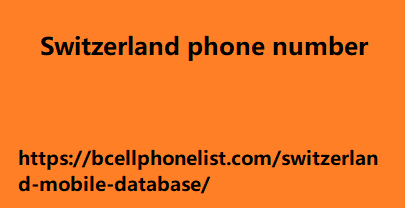In today’s fast-paced world, managing incoming calls effectively is crucial for businesses to maintain excellent customer service and enhance productivity. An incoming call is when a person or organization receives a phone call from an external party. Handling incoming calls efficiently requires a combination of proper communication skills, time management, and technology. In this comprehensive guide, we will explore tips and best practices for managing incoming calls effectively.
How to Handle Incoming Calls Professionally
- Answer Promptly: The first step in managing incoming calls is to answer promptly. Customers appreciate a quick Switzerland phone number response, so it’s essential to pick up the phone within the first few rings.
- Greet the Caller: Always greet the caller with a warm and professional tone. A simple “Hello, thank you for calling [Company Name], how may I assist you?” goes a long way in setting a positive tone for the conversation.
- Active Listening: Pay attention to the caller’s needs and actively listen to their concerns. This demonstrates empathy and shows that you value their time and feedback.
- Take Notes: It’s essential to take notes during the call to ensure that you capture all relevant information. Notes can help you follow up effectively and provide a personalized customer experience.
- Be Courteous: Always maintain a polite and courteous tone, even if the caller is frustrated or angry. Professionalism is key in all interactions with customers.
Common Challenges in Managing Incoming Calls

- Call Volume: High call volume can be overwhelming, leading to long wait times and frustrated customers. Implementing ASB Directory a call queuing system can help manage incoming calls efficiently.
- Handling Difficult Customers: Dealing with difficult customers can be challenging but is an essential part of customer service. Stay calm, empathize with their concerns, and work towards finding a solution.
- Transferring Calls: When transferring calls, ensure that you provide clear information to the next agent to avoid miscommunication and repetition of information.
- Call Routing: Implement call routing strategies to direct calls to the right department or agent, ensuring timely resolution of customer queries.
Technology Solutions for Managing Incoming Calls
- Interactive Voice Response (IVR): IVR systems help route incoming calls to the appropriate department or agent, streamlining the call process and reducing wait times.
- Call Tracking Software: Call tracking software allows businesses to monitor call metrics, such as call volume, average call duration, and call resolution rates, to optimize their call handling processes.
- VoIP Technology: Voice over Internet Protocol (VoIP) technology enables businesses to handle incoming calls over the internet, offering cost-effective and flexible communication solutions.
Conclusion
Effectively managing incoming calls is essential for businesses to provide exceptional customer service and streamline their communication processes. By following best practices, handling challenging situations with professionalism, and leveraging technology solutions, businesses can enhance their call Remember, each incoming call is an opportunity to create a positive impression and build long-lasting customer relationships.
